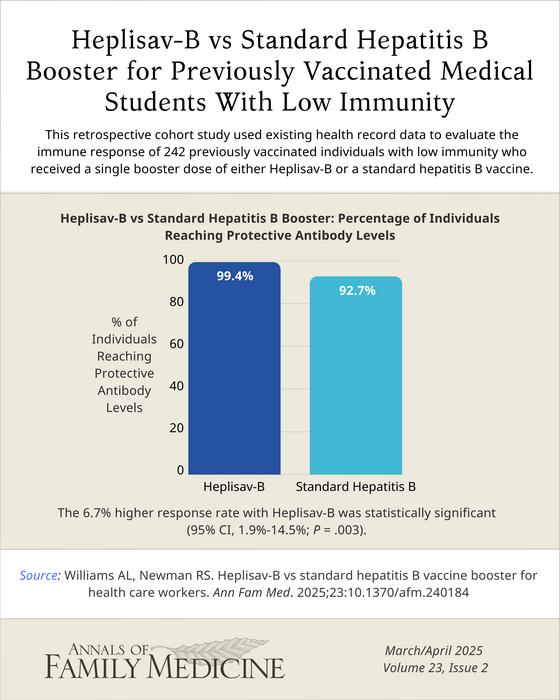In recent years, vaccine development has made significant strides, particularly in combating viral infections such as hepatitis B. Health care workers, who are routinely exposed to blood and other bodily fluids, are at an increased risk of contracting hepatitis B and consequently must be vaccinated to ensure their protection. An intriguing new study has emerged, shedding light on the effectiveness of Heplisav-B, a novel hepatitis B vaccine, compared to the conventional hepatitis B booster vaccines. This study was conducted with a focus on individuals who had previously completed the full vaccination series yet exhibited low antibody levels, thereby necessitating a booster to assess their immunity.
The research was carried out as a retrospective cohort study by experts at the Uniformed Services University of the Health Sciences. Researchers meticulously analyzed the medical records of participants from 2019 to 2022. The participants included medical students who had undergone the full hepatitis B vaccination series but were found to have insufficient antibody levels. By comparing the responses of two groups—one receiving the Heplisav-B booster and the other receiving a standard hepatitis B booster—the study aimed to determine which vaccine would elicit a more robust immune response.
As the results came through, clarity emerged regarding the performance of both vaccines. A staggering 99.4% of participants who received the Heplisav-B booster achieved protective antibody levels, signifying a substantial improvement in their immunity against hepatitis B. In stark contrast, the traditional booster vaccine yielded a lower response rate, with only 92.7% of individuals reaching protective levels. This clear distinction led to the observation of a statistically significant increase of 6.7% in the response rate among those vaccinated with Heplisav-B, underlining the vaccine’s superiority in reinforcing immunity. The data compiled further indicated that of the individuals who did not respond to the initial booster, each of them successfully achieved immunity after receiving additional vaccinations.
The compelling findings from this study hold significant implications for public health, particularly in the context of health care workers who are incredibly vital to the functioning of health care systems. The evidence supporting Heplisav-B as a more effective booster opens several avenues for discussion on vaccination policies and recommendations for health care workers. The primary takeaway is that a single booster dose of Heplisav-B is likely sufficient for most young, healthy health care workers who have completed the full vaccination sequence, simplifying the vaccination program and ensuring enhanced protection against the virus.
Furthermore, the research presents an opportunity for further investigation into the use of Heplisav-B outside the confines of this specific study group. Questions regarding its efficacy in different demographics and under varying conditions remain. Future studies could expand on the present findings and explore how Heplisav-B might be utilized in wider populations, particularly among those at higher risk or with differing health statuses.
As we delve deeper into the intricacies of vaccine development and immunization strategies, it becomes increasingly critical to address the factors that influence vaccine uptake among health care professionals. One must acknowledge the persistent hesitancy and varied perceptions surrounding vaccinations, even within the medical community. Education and awareness campaigns can play a key role in alleviating concerns and promoting confidence in new vaccine formulations, thereby enhancing public health outcomes.
The overarching significance of this research goes beyond the scope of just protecting individual health care workers. It underscores the need for a systemic approach to immunization protocols that can adapt as new evidence emerges. As the medical field continually evolves, the protocols governing vaccination schedules must also be agile and responsive. Health care systems should consider integrating emerging evidence into practice guidelines to safeguard those at risk while promoting community health at large.
Moreover, it stands to reason that disseminating information regarding the efficacy of newer vaccines such as Heplisav-B can reshape the conversations about vaccination policies in workplaces. Health care institutions may find value in adopting evidence-based recommendations that could enhance employee well-being and contribute to a healthier workforce. A culture of continuous learning and adaptation in health care settings will be paramount in addressing emergent health threats, including infectious diseases.
In conclusion, the study contrasting Heplisav-B against standard hepatitis B vaccines elucidates the potential advantages of newer vaccination options in reinforcing immunity among health care workers. With results showcasing a significantly higher antibody response linked to Heplisav-B, the opportunity to reshape vaccination strategies based on evolving evidence cannot be overlooked. The path forward is clear—health care systems must remain committed to adopting practices founded on robust research while fostering an environment of trust and collaboration among health care professionals.
In this rapidly changing landscape of medical science, the results of such studies serve as a beacon of hope, paving the way for new innovations in vaccine technology and public health strategies that can ultimately save lives and improve the overall health of communities.
Subject of Research: Effectiveness of Heplisav-B vs Standard Hepatitis B Vaccine Booster for Health Care Workers
Article Title: Heplisav-B vs Standard Hepatitis B Vaccine Booster for Health Care Workers
News Publication Date: 24 March 2025
Web References: Annals of Family Medicine
References: Not provided
Image Credits: Annals of Family Medicine
Keywords: Health and medicine, Vaccination, Hepatitis B, Family medicine, Public health




